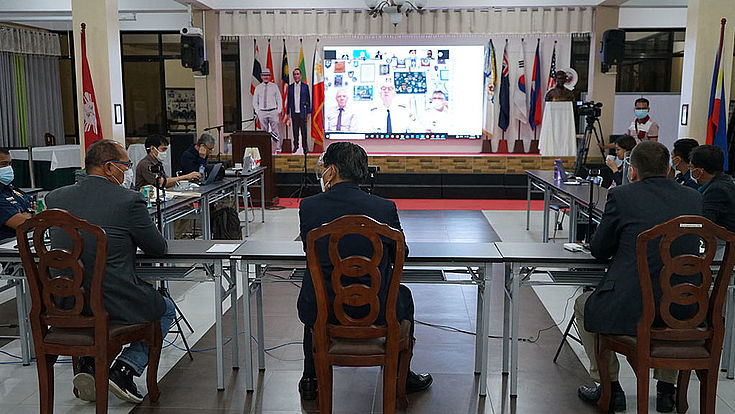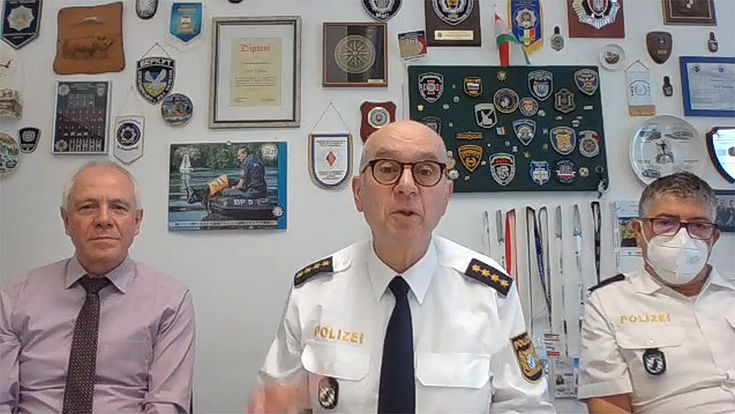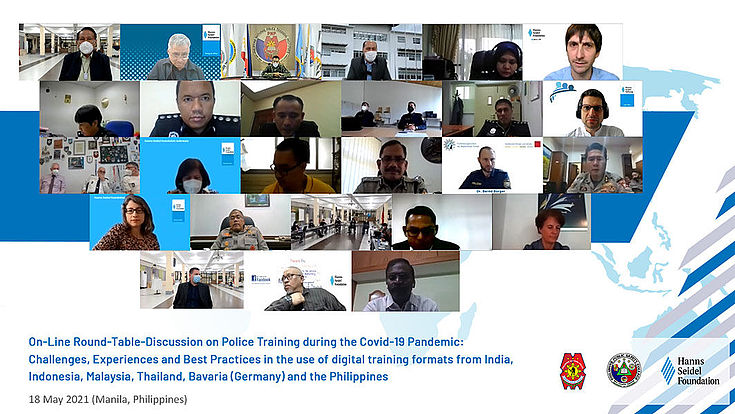Sharing best practices in policing in the region
On-line Conference to Discuss Police Training during the Pandemic
Philippine participants at the National Police College
HSF
Under its Regional Dialogue Program, the Hanns Seidel Foundation (HSF) works with the police agencies in the region to promote regional dialogue and information exchanges among the countries police training organizations to develop common solutions to regional concerns. Evidently, the Covid-19 Pandemic remains a big challenge for police training which in the past and presumably through the present time largely depends on physical presence and conduct of practical training. HSF partnered with the Philippine Public Safety College (PPSC) for the latter to conduct a regional on-line conference to share information region how the participating police organizations are coping with the challenge to conduct training during the Covid-19 Pandemic given the limitations on physical and face-to-face teaching, possibly with the use of digital teaching methods.
Over twenty police training officials from five countries attended the conference which had training experts from the Bavarian Police provide their experiences in using digital training formats. Police training officials who participated came from the Karnataka Police Academy in India, the Indonesian National Police Education and Training Institute (Lemdiklat), the Royal Malaysian Police College, the Philippines’ National Police Training Institute, the Philippine Public Safety College/National Police College and the Royal Thai Police/Royal Police Cadet Academy.
Presentation of the officials from the Bavarian Police
HSF
In their presentation, the officials from the Bavarian Police said that the effectiveness of using digital training technologies is dependent on : (a) having the knowledge to operate, and access to digital equipment; (b) having a well-developed and relevant (to policing experiences) learning management system or LMS; (c) ensuring the technical qualifications of the police teachers and trainers; and (d) the organization embracing a didactic teaching concept based on a long-term (continuous) learning process using all available (including on-line) teaching/training methods with the objective of improving the competencies of both teachers and student.
The country participants agreed that the Covid-19 pandemic has raised awareness among police training agencies to consider, and adapt health and safety protocols for limited physical training and more importantly, started, if not accelerated plans for the training institutions to consider and eventually use digital training technologies, in part adapting to use of emerging global digital technologies and also in response to health and safety considerations which preclude physical and face-to-face training.
In response to the limitations imposed by the Covid-19 pandemic, terminating on-going training and/or deferring physical/face-to-face training given health considerations, inordinate demands on police recruits and officers undergoing training to be deployed to “front-liner” duties such as enforcing quarantine, health and safety protocols, the participating police agencies listed some of the actions already being taken as listed below.
- Developing, piloting, and/or long-term planning for having/using an E-learning based, self-paced, distance learning using a Learning Management System (LMS) which is hosted through the institution’s data centre.
- Encouraging police officers’ availing of public e-learning platforms and massive open online courses (MOOCs) to prepare/familiarize/qualify themselves with the use of digital training technologies being developed by the police organization or other required academic courses.
- Recording, documenting (and/or editing) of records of conducted digital training for future improvements and dissemination to other classes.
- Recalibration of existing Learning Design, Program of Studies and Standard Learning Packages to incorporate use of digital training technologies.
- Utilization of In-place Information Systems from Admission to Graduation to minimize health risks brought about by physical contact.
- Establishing linkages with academic institutions the latter providing technical expertise to develop the LMS and adapting same to policing operations.
- Establishing linkages with cognizant government organizations promoting use of, and conducting training of government (including police) personnel on the use of e-learning technologies.
The participants were positive that the use of digital technologies, on-line and e-learning technologies is part of the future of teaching and training and it allows (virtual) access to resource persons and cuts teaching expenses as these relate to travel, accommodations, food, and others aside from being accessible to police officers who have to be on duty or on call the whole time. They also said that the development of e-learning materials and tools encourage linkages between the police training organizations and complementing academic and technical resource institutions.
Participants connected online
HSF
To further use of digital training technologies, police organizations should endeavor to raise the training and skills levels of incoming police recruits/trainees/students for them to have an entry-level knowledge and comprehension on the use of digital training technologies; continuously train faculty and instructors for them to be competent and effective in teaching using digital training technologies; improving existing digital training facilities and internet connectivity; and planning and budgeting for increased government support for acquisition of digital training equipment and continued raining of teachers; reviewing available commercial e-learning software regarding its suitability for police training including adapting these for policing scenarios; and maintaining linkages with other police training organizations with the intent to share experiences and possibly digital training tools (during the conference, participants expressed willingness to maintain contact and linkages with each other)
Other concerns expressed in the conference as these relate to use of digital training technologies were the: standardization of teaching (and evaluation) methods using digital training technologies; ensuring the security of information passed on during the conduct of e-learning, hence considering use of secure information networks and transmission platforms (e.g. Virtual Private Network or VPN); continued sharing of experiences as these relate to commercial software being used for training police offices, possibly to advise each other of the softwares’ advantages and limitations; and that a significant component of police training still depends on physical presence and conduct of practical training scenarios and the use of digital training formats is not intended to replace the former but rather to strengthen the mental, analytical and problem-solving skills of the police officers which function in partnership with their physical abilities.
Towards the end of the discussions, the participants acknowledged the positive effects of having participated in this conference which they found very timely and relevant to their present training programs. They expressed their appreciation to the Hanns Seidel Foundation for supporting this initiative and hoped that there will be similar conferences albeit with a more focused set of discussions, with the concluded conference providing the benchmark on how the participating organizations fared in the use of digital training technologies. Participants expressed their appreciation to the Bavarian Police officials who gave a presentation and the former hoped thay could continue to exchange information with, and benefit from the latter’s experiences and teaching materials related to police training.



